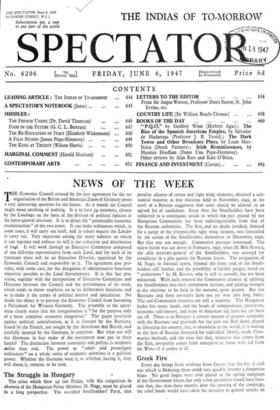NEWS OF THE WEEK
THE Economic Council created by the new agreement for the re- organisation of the British and American Zones of Germany poses a very interesting question for the future. As it stands the Council might mean anything or nothing. It is to have 54 members, chosen by the Landtage on the basis of the division of political opinion at the latest general elections. It is to direct the "permissible economic reconstruction" of the two zones. It can make ordinances which, in some cases, it will carry out itself, and in others require the Lander to carry out. Very important among the many subjects on which it can legislate and enforce its will is the collection and distribution of focid. It will work through an Executive Committee composed of one full-time representative from each Land, and for each of its functions there will be an Executive Director, appointed by the Economic Council and responsible to it. The agreement also pro- vides, with some care, for the delegation of administrative functions wherever possible to the Land Governments. It is this last pro- vision, together with the interposition of Executive Committee and Directors between the Council and the performance of its work, which tends to throw emphasis on to its deliberative functions and so to make it the centre of political interest and speculation. No doubt the object is to prevent the Economic Council from becoming a Parliament for Western Germany. The preamble to the agree- ment clearly states that the reorganisation is "for the purpose only of a more complete economic integration." The paper provision against political centralisation, as it is forecast by the Russians, feared by the French, not sought by the Americans and British, and carefully ignored by the Germans, is complete. But what use will the Germans in fact make of the instrument now put in their hands? The distinction between economics and politics is academic rather than real. The power to "adopt and promulgate ordinances" on a whole series of economic questions is a political power. Whether the Germans want it, or whether, having it, they will abuse it, remains to be seen.


































